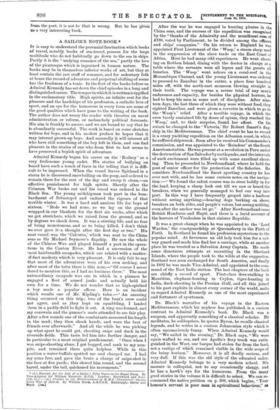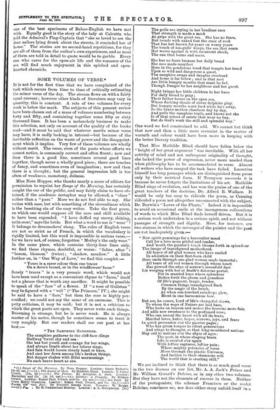A SAILOR'S NOTEBOOK.* IT is easy to understand the perennial
fascination which books of travel, notably books of sea-travel, possess for the large multitude who do not habitually go down to the sea in ships. Partly it is the "undying romance of the sea," partly the love of the picaresque which is ingrained in human nature. The books may be in themselves inferior works of art, but they at least contain the raw stuff of romance, and for sedentary folk at home the record of adventure and perpetual shifting of scene has the freshness of a tonic. In the first of the books before us Admiral Kennedy has set down the chief episodes in a long and distinguished career. The temper in which it is written is typified in the exclamatory title. High spirits, an infinite zest for the pleasure and the hardships of his profession, a catholic love of sport, and an eye for the humorous in every form are some of the good qualities which have gone to the writing of the book. The author does not weary the reader with theories on naval administration or reform, or melancholy political forecasts. His aim is frankly to amuse, and we are bound to say that be is abundantly successful. The work is based on some sketches written for boys, and in his modest preface he hopes that it may interest grown-up boys. And assuredly it will interest all who have still something of the boy left in them, and can find pleasure in the stories of one who from first to last seems to have preserved a boyish spirit of adventure.
Admiral Kennedy began his career on the 'Rodney' as a very frolicsome young cadet. His stories of bullying on board have such a touch of farce in the telling that it , is diffi- cult to be impressed. When the vessel leaves Spithead in a storm he is discovered snowballing on the poop, and ordered to remain there for the rest of the day and sweep it clean,—an effective punishment for high spirits. Shortly after the Crimean War broke out and his vessel was ordered to the Black Sea. The young midshipman took part in the bom- bardment of Sebastopol and endured the rigours of that terrible winter. It was a hard and anxious life for boys of sixteen. "Beds we had none, so we lay on the ground wrapped in our blankets for the first six weeks, after which we got stretchers, which we raised from the ground, and so by degrees we shook down. It was a stirring life, and no fear of being monotonous, and as to being killed, I don't think we ever gave it.a thought after the first day or two." His next vessel was the Calcutta,' which was sent to the China seas as Sir Michael Seymour's flagship. He saw the whole of the Chinese War, and played himself a part in the opera- tions in the Canton River. He had a succession of the most hairbreadth escapades, which are related with a matter. 3f-fact modesty which is very pleasant. It is only fair to say that most of the adventures were of his own seeking, and after most of the tales there is this note,—" Of course I never dared to mention this, as I had no business there." The most extraordinary escapade was one in which in a pinnace he engaged a fleet of armed junks and actually held his own for a time. We do not wonder that so high-spirited a boy made a popular officer. Here is an incident which recalls one of Mr. Kipling's tales :—" An amusing thing occurred on this trip ; two of the boat's crew could not agree, and as they kept on squabbling, I landed hem in a paddy-field to fight it out. A ring was formed, and my coxswain and the gunner's mate attended to see fair play. After a few rounds one of the combatants measured his length in the mud; they then shook hands, and were the best of friends ever afterwards." And all the while he was picking up what sport he could get, shooting snipe and duck in the riverside fields. This taste led him into further danger, and in particular to a most original predicament. "Once when I was snipe-shooting alone, I got bogged, and sank to my arm- pits, and remained there quite helpless. While in this position a water-buffalo spotted me and charged me. I had my arms free, and gave the brute a charge of snipe-shot in the face at five yards; this slewed him round, and the second barrel, under the tail, quickened his movements."
9 (I.) Hurrah for the Life of a Sailor ! Fifty Years in the Royal Navy. By Vice-Admiral Sir William Kennedy, K.C.B. London : Blackwood and Sons. [128. 6d.)--(2.) Cruises in the Mediterranean of H.M.S. 'Chanticleer' during Greek War of 1821-26. By William Black, L.R.C.S.E. Edinburgh: Oliver and
Boyd. [1A.]
After the war he was engaged in hunting pirates in the China seas, and the success of the expedition was recognised by the "thanks of the Admiralty and the munificent sum of £180, voted by Parliament, to be divided among the officers and ships' companies." On his return to England he was appointed First Lieutenant of the Wasp,' a steam sloop used in the suppression of the slave trade on the East Coast of Africa. Here he had many odd experiences. He went shoot. ing on Robben Island, dining with the doctor in charge at a table where the servants were all lepers and the guests all lunatics. The 'Wasp' went ashore on a coral-reef in the Mozambique Channel, and the young Lieutenant was ordered to proceed to Zanzibar in the cutter, a place four hundred miles off, with the north-east monsoon blowing straight in their teeth. The voyage was a severe trial of any man's endurance and capacity, for besides the physical horrors, he had to keep his men in some sort of discipline. After nine- teen days, the last three of which they were without food, they sighted Zanzibar, and were given a corvette in which to go to the 'Wasp's' relief. After a terrible voyage, in which the crew barely sustained life by doses of opium, they reached the
Wasp,' and, to their surprise, found her afloat. On his return he changed to the Victoria,' Sir Robert Smart's flag- ship in the Mediterranean. The chief event he has to record is a crazy yachting expedition on the Albanian coast, in which he suffered shipwreck. Soon after he received his Commander's commission, and was appointed to the 'Reindeer' at the South American station. He was present at a revolution in Peru and at the destruction of San Salvador by earthquake, and the intervals of such excitement were filled up with some excellent shoot. ing. Then he proceeded to Newfoundland, where he held the post of senior officer for the protection of the fisheries. He considers Newfoundland the finest sporting country he has ever met with, and he has some curious notes on the naviga- tion :—" We found the safest course was to steer boldly in for the land, keeping a sharp look out till we saw or heard the breakers, when we generally managed to feel our way into port. In this way I have frequently groped into a harbour without seeing anything,—hearing dogs barking on shore, breakers on both sides, and people's voices, but seeing nothing, even after the anchor was let go." • After Newfoundland came British Honduras and Hayti, and there is a lurid account of the horrors of Voodooism in that sinister Republic.
It was a great change when he was appointed to the 'Lord Warden,' the coastguardship at Queensferry in the Firth of Forth. In Scotland he found his profession mysterious to the popular mind. At Inverness an old lady took him for a rail- way guard and made him find her a carriage, while at another place he was treated as a Salvation Army Captain. He made some disastrous attempts at recruiting in the Shetland Islands, where the people took to the wilds at the suggestion. Scotland was soon exchanged for South America, and finally in 1892 he was made Vice-Admiral, and appointed to the com- mand of the East India station. The last chapters of the book are chiefly a record of sport. First-class deer-stalking in Mauritius, elephant-hunting in Ceylon, tiger-hunting in India, duck-shooting in the Persian Gulf, and all this joined to his past exploits in almost every corner of the world, make us regard Admiral Kennedy as one of the most experienced and fortunate of sportsmen.
Dr. Black's narrative of his voyage in the Eastern Mediterranean, which his nephew has published, is a curious contrast to Admiral Kennedy's book. Dr. Black was a surgeon, and apparently something of a classical scholar. He meditates, he soliloquises, he quotes Byron, he recalls classical legends, and he writes in a curious Johnsonian style which is often unconsciously funny. When Admiral Kennedy would say, "We sailed in the evening," Dr. Black says, "We were again wafted to sea, and ere Apollo's fiery track was extin- guished in the West, our barque had stolen far from the land, not a vestige of which remained visible in the wide scope of the briny horizon." Moreover, it is all deadly serious, and very dull. If this was the old style of the educated sailor, Admiral Kennedy belongs to a very modern school. His manner is colloquial, not to say occasionally slangy, and he has a hawk's eye for the humorous. From the many good stories in the volume it is difficult to select. We can re- commend the native petition on p. 308, which begins, "Your honour's servant is poor man in agricultural behaviour," all one of the best specimens of Baboo-English we have met with. Equally good is the story of the lady at Calcutta who .told the Admiral's Flag-Captain that "she so loved to see the dear sailors lying drunk about the streets, it reminded her of home." The stories are no second-hand repetitions, for they are all of them from the author's own experiences, and as most of them are told in detail to quote would be to garble. Every one who cares for the open-air life and the romance of the sea will find much enjoyment in this spirited and open- hearted chronicle.



















































 Previous page
Previous page